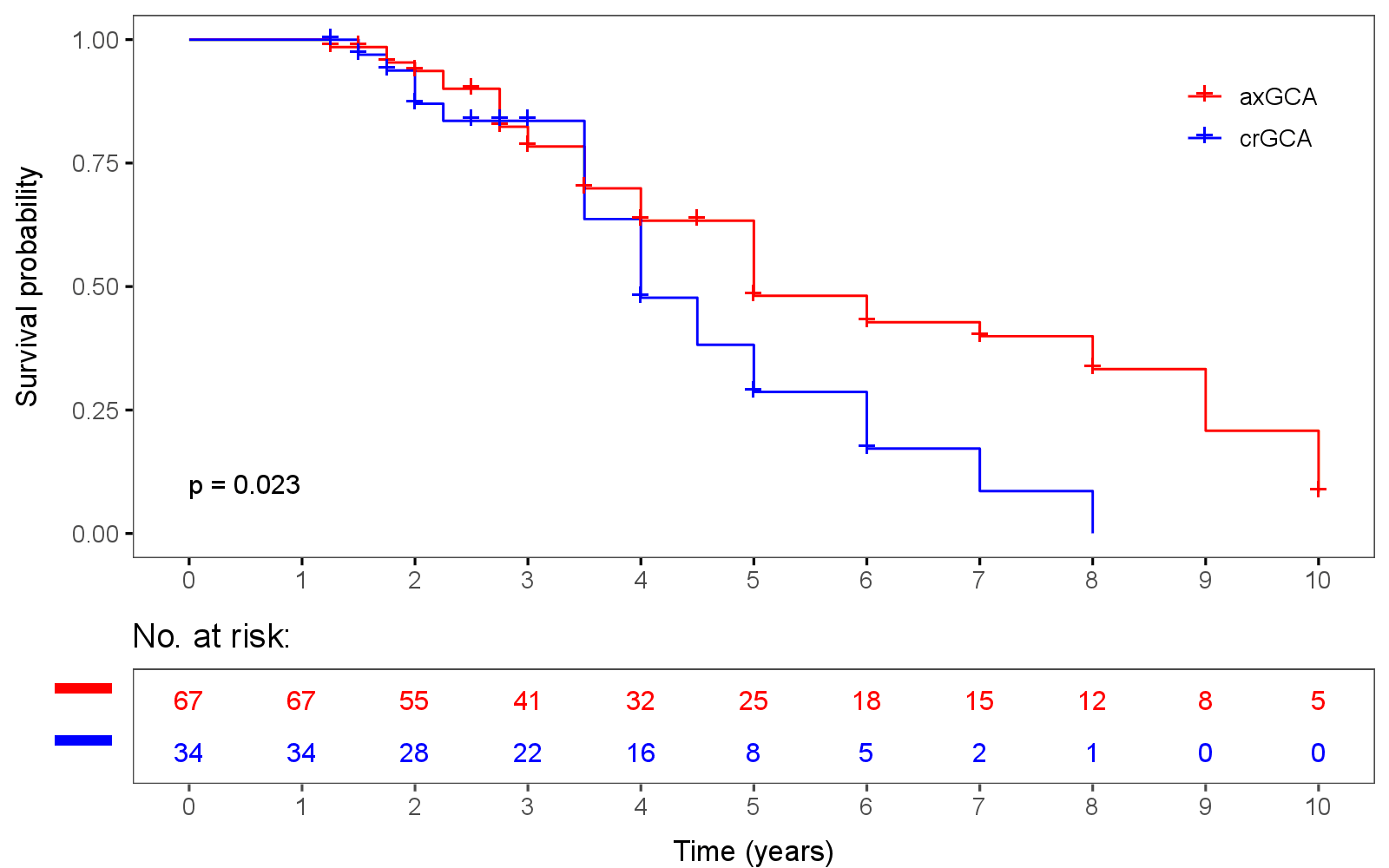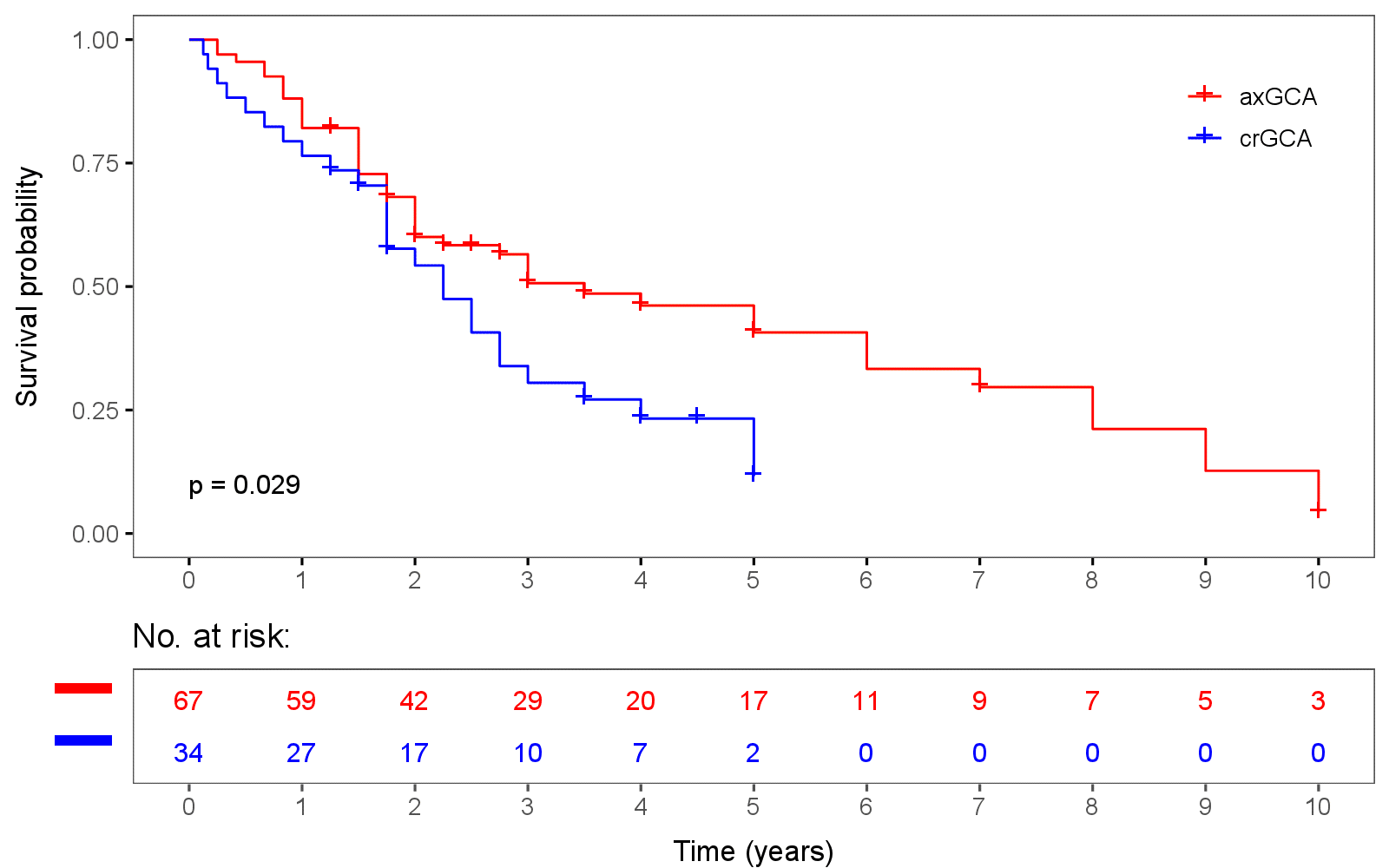Session Information
Date: Friday, November 6, 2020
Title: Vasculitis – Non-ANCA-Associated & Related Disorders II: GCA Clinical & Epidemiology (0514–0518)
Session Type: Abstract Session
Session Time: 4:00PM-4:50PM
Background/Purpose: Prognostic markers for clinical outcomes in giant cell arteritis (GCA) are urgently needed. While large vessel GCA (LV-GCA) has been associated with higher glucocorticoid (GC) dose and increased relapses, data are still controversial (Muratore et al. 2015). The axillary artery is almost always affected in LV-GCA patients (axGCA) (Schmidt et al. 2008; Czihal et al. 2012), however, it is not yet clear whether axGCA patients have more relapses and a higher GC need, compared to GCA with exclusive cranial vessel involvement (crGCA).
The aim of this study was to determine the prognostic value of axillary artery involvement in GCA in respect to cumulative GC doses and relapse rates.
Methods: Ultrasound (US) of the axillary arteries was performed in GCA patients at the time of diagnosis and at multiple follow-up visits. Patients with US signs of axillary artery vasculitis at the time of diagnosis were compared with patients in whom US was exclusively positive in cranial arteries. Cumulative GC doses and relapse rates were calculated for the most recent study visit and survival analysis was performed to determine differences between the groups concerning the time until the first relapse and the cessation of GC treatment. Linear mixed models were used to assess the effect of GC and relapses on the axillary artery wall in axGCA patients.
Results: Sixty-seven patients had US signs of vasculitis of the axillary arteries at baseline (=axGCA group), while 34 patients had exclusively signs of vasculitis in the cranial arteries (=crGCA group). Mean (SD) age at diagnosis was 68.0 (7.3) years in the axGCA group and 72.4 (6.5) years in the crGCA group; 72% and 56% were female, respectively. Time from diagnosis was 48 months in both groups (range: axGCA: 16-137, crGCA: 16-102). Median time until GC cessation was 60 months (95% CI: 60-108) in the axGCA group compared to 48 months (95% CI: 42-72) in the crGCA group (p=0.0239), while median time until the first relapse was 42 months (95% CI: 24-84) vs 27 months (95% CI: 21-42; p=0.029), as depicted in figure 1 and 2. Median cumulative GC doses were higher in the axGCA group with 6801mg (range: 1748-34169), compared to the crGCA group with 5633mg (range: 2553-19967; p=0.052), while median cumulative number of relapses were similar with 2 (range: 0-16) and 1 (range: 0-13) in the axGCA and crGCA group, respectively (p=0.67). While we observed a continuous decline of the intima media thickness (IMT) over the entire study period, the cumulative GC dose had no significant effect on IMT decrement. In contrast, a clinical relapse resulted in an increase of the IMT by 0.18mm (95% CI: 0.07-0.30; p=0.003).
Conclusion: GCA patients with vasculitis of the axillary artery have longer GC treatment and higher cumulative GC doses compared to GCA patients without vasculitis of axillary arteries. Relapse rates are similar between the groups but occur later in patients with axillary artery involvement. Also, relapses lead to an IMT increase of axillary arteries.
 Figure 1. Kaplan-Meier curves assessing time until cessation of glucocorticoid treatment in patients with giant cell arteritis with (axGCA) and without (crGCA) vasculitis of the axillary artery.
Figure 1. Kaplan-Meier curves assessing time until cessation of glucocorticoid treatment in patients with giant cell arteritis with (axGCA) and without (crGCA) vasculitis of the axillary artery.
 Figure 2. Kaplan-Meier curves assessing the time until the first clinical relapse in patients with giant cell arteritis with (axGCA) and without (crGCA) axillary artery involvement.
Figure 2. Kaplan-Meier curves assessing the time until the first clinical relapse in patients with giant cell arteritis with (axGCA) and without (crGCA) axillary artery involvement.
To cite this abstract in AMA style:
Bosch P, Dejaco C, Schmidt W, Krause A, Schlüter K, Pregartner G, Schaefer V. The Impact of Large Vessel Vasculitis of the Axillary Artery on Cumulative Glucocorticoid Dose and Relapse Rate in Giant Cell Arteritis [abstract]. Arthritis Rheumatol. 2020; 72 (suppl 10). https://acrabstracts.org/abstract/the-impact-of-large-vessel-vasculitis-of-the-axillary-artery-on-cumulative-glucocorticoid-dose-and-relapse-rate-in-giant-cell-arteritis/. Accessed .« Back to ACR Convergence 2020
ACR Meeting Abstracts - https://acrabstracts.org/abstract/the-impact-of-large-vessel-vasculitis-of-the-axillary-artery-on-cumulative-glucocorticoid-dose-and-relapse-rate-in-giant-cell-arteritis/
